GameStop
GameStop Corp. is an American video game, consumer electronics, and gaming merchandise retailer.[1] The company is headquartered in Grapevine, Texas (a suburb of Dallas), and is the largest video game retailer worldwide.[2] As of 28 January 2023, the company operates 4,413 stores including 2,949 in the United States, 216 in Canada, 419 in Australia and 829 in Europe under the GameStop, EB Games, EB Games Australia, Micromania-Zing, ThinkGeek and Zing Pop Culture brands.[1][3] The company was founded in Dallas in 1984 as Babbage's, and took on its current name in 1999.
Logo since 2000 | |
| Formerly | Babbage's (1984–1999) |
|---|---|
| Type | Public |
| Industry | Retail |
| Predecessors |
|
| Founded | 1984 |
| Founders |
|
| Headquarters | , U.S. |
Number of locations | 4,413 (Jan 2023) |
Area served | Several countries
|
Key people | Ryan Cohen (Chairman and CEO) |
| Products | |
| Revenue | |
| Total assets | |
| Total equity | |
Number of employees | 11,000 full-time 14,000–27,000 part-time (Jan 2023) |
| Parent | NeoStar Retail Group (1994–1996) Babbage's Etc. (1996–1999) Barnes & Noble (1999–2004) |
| Subsidiaries | |
| Website | gamestop |
| Footnotes / references [1] | |
The company's performance declined during the mid-to-late 2010s due to the shift of video game sales to online shopping and failed investments by GameStop in smartphone retail. In 2021, after retail investors noticed that the short interest well exceeded the float, the company's stock price skyrocketed. According to the SEC report, this volatility was only in part due to the shorts covering their positions, but mostly thanks to the massive buying power of retail investors. The company received significant media attention during January and February 2021 due to the volatility of its stock price in the GameStop short squeeze. The company is now ranked 521st on the Fortune 500.[3] In addition to retail stores, GameStop owns and publishes Game Informer, a video game magazine, transformed itself into an e-commerce business, and launched an NFT platform.
History
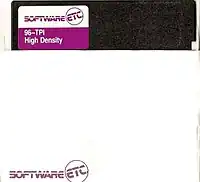
Babbage's (1984–1994)
GameStop traces its roots to Babbage's, a Dallas, Texas-based software retailer founded in 1984 by former Harvard Business School classmates James McCurry and Gary M. Kusin.[4] The company was named after Charles Babbage[5] and opened its first store in Dallas's NorthPark Center with the help of Ross Perot, an early investor in the company.[6] The company quickly began to focus on video game sales for the then-dominant Atari 2600. Babbage's began selling Nintendo games in 1987.[7] Babbage's became a public company via an initial public offering in 1988.[7] By 1991, video games accounted for two-thirds of Babbage's sales.[7]
NeoStar Retail Group (1994–1996)
Babbage's merged with Software Etc., an Edina, Minnesota-based retailer that specialized in personal computing software, to create NeoStar Retail Group in 1994.[8][9] The merger was structured as a stock swap, where shareholders of Babbage's and Software Etc. received shares of NeoStar, a newly formed holding company. Babbage's and Software Etc. continued to operate as independent subsidiaries of NeoStar and retained their respective senior management teams.[8] Babbage's founder and chairman James McCurry became chairman of NeoStar, while Babbage's president Gary Kusin and Software Etc. President Daniel DeMatteo retained their respective titles. Software Etc. chairman Leonard Riggio became chairman of NeoStar's executive committee.[8]
Gary Kusin resigned as president of Babbage's in February 1995 to start a cosmetics company. Daniel DeMatteo, formerly president of Software Etc., assumed Kusin's duties and was promoted to president and chief operating officer of NeoStar. NeoStar chairman James McCurry was also appointed to the newly created position of NeoStar CEO.[10] The company relocated from its headquarters in Dallas to Grapevine later that year.[11]
NeoStar merged its Babbage's and Software Etc. units into a single organization in May 1996 amid declining sales. Company president Daniel DeMatteo also resigned, and NeoStar chairman and CEO James McCurry assumed the title of president.[12] In September of that year, after NeoStar was unable to secure the credit necessary to purchase inventory necessary for the holiday season, the company filed for Chapter 11 bankruptcy and appointed Thomas G. Plaskett chairman while James McCurry remained company chief executive and president.[13]
The leadership changes were not enough; in November 1996, the assets of NeoStar were purchased for $58.5 million by Leonard Riggio, a founder of Software Etc. and chairman and principal stockholder of Barnes & Noble. Electronics Boutique had also bid to purchase NeoStar, but the judge presiding over NeoStar's bankruptcy accepted Riggio's bid because it kept open 108 stores more than Electronics Boutique's bid would have. Approximately 200 retail stores were not included in the transaction and were subsequently closed.[14]
Babbage's Etc. (1996–1999)
Following his purchase of NeoStar's assets, Leonard Riggio dissolved the holding company and created a new holding company named Babbage's Etc.[7] He appointed Richard "Dick" Fontaine, previously Software Etc.'s chief executive during its expansion in the late 1980s and early 1990s, as Babbage Etc.'s chief executive. Daniel DeMatteo, previously the president of both Software Etc. and NeoStar, became company president and COO.[7] Three years later, in 1999, Babbage's Etc. launched its GameStop brand with 30 stores in strip malls. The company also launched gamestop.com, a website that allowed consumers to purchase video games online. GameStop.com was promoted in Babbage's and Software Etc. stores.[7]
Barnes & Noble Booksellers (1999–2004)
In October 1999, Barnes & Noble Booksellers purchased Babbage's Etc. for $215 million.[15] Because Babbage's Etc. was principally owned by Leonard Riggio, who was also Barnes & Noble's chairman and principal shareholder, a special committee of independent directors of Barnes & Noble Booksellers evaluated and signed off on the deal.[16] A few months later, in May 2000, Barnes & Noble acquired Funco, the owner of Eden Prairie, Minnesota-based video game retailer FuncoLand, for $160 million.[17] Babbage's Etc., which had been previously operating as a direct subsidiary of Barnes & Noble, became a wholly owned subsidiary of Funco.[18] With its acquisition of Funco,[19] Barnes & Noble also acquired Game Informer, a video game magazine that was first published in 1991.[20] Funco was renamed GameStop, Inc. in December 2000 in anticipation of holding an initial public offering for the company.[7][21]
In February 2002, the company once again became a public company via an initial public offering.[22] Barnes & Noble retained control over the newly public company with 67% of outstanding shares and 95% of voting shares. Barnes & Noble retained control over GameStop until October 2004, when it distributed its 59% stake in GameStop to stakeholders of Barnes & Noble, making it an independent company.[23]
Expansion (2004–2016)
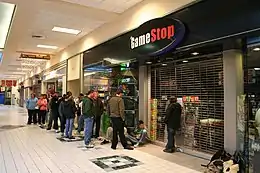

.jpg.webp)
Acquisitions
- In 2005, GameStop acquired EB Games (formerly Electronics Boutique) for $1.44 billion. This expanded GameStop's operations into Australia, Canada, Europe and New Zealand. GameStop's operations expanded to over 4,250 stores worldwide as a result of the acquisition.
- In 2007, GameStop acquired Rhino Video Games, who operated 70 video game stores throughout the Southeastern United States, from Blockbuster for an undisclosed amount.[24][25]
- In April 2008, GameStop acquired Free Record Shop's 49 Norwegian stores.[26]
- In October 2008, GameStop acquired Micromania, a French video-game retailer, for $700 million.[27][28] GameStop, which had previously owned no stores in France, now had 332 French video-game stores.[29]
- In November 2009, it acquired a majority stake in Jolt Online Gaming, an Irish browser game studio.[30] Jolt closed in 2012.[31]
- In 2010, GameStop acquired Kongregate, a San Francisco-based website for browser-based games.[32][33] In 2017, it was sold for $55 million.[34]
- In 2011, GameStop acquired Spawn Labs and Impulse in separate transactions.[35][36] Spawn Labs was a developer of technology that allowed users to play video games that were run remotely on machines in data centers rather than their personal computer or console. Impulse was a digital distribution and multiplayer video game platform acquired from Stardock, and renamed GameStop PC Downloads. Under the ownership of GameStop, the service was redesigned and sold games that use other platforms such as Steam while also selling games that use its own proprietary DRM solution, Impulse:Reactor.[35] GameStop shut down both PC Downloads and Spawn Labs in 2014.[37]
- In 2012, GameStop acquired BuyMyTronics, a Denver-based online market place for consumer electronics.[38]
- In October 2012, GameStop acquired a 49.9% ownership interest in Simply Mac, a Salt Lake City-based Apple authorized reseller and repairer founded in 2006. GameStop acquired the remaining 50.1% of ownership in November 2013. GameStop tried to target areas for potential new Simply Mac locations in smaller markets that did not have an existing Apple Store within a reasonable driving distance.[39][40][41] In January 2017, GameStop closed many Simply Mac locations. The chain had as many as 70 locations at the time of the announcement.[42][43] In 2019, GameStop divested Simply Mac; at that time it had 43 stores.[44][45]
- In November 2013, GameStop acquired Spring Mobile, a Salt Lake City-based retailer of AT&T-branded wireless services.[46]
- It acquired 163 RadioShack locations in February 2015.[47]
- In July 2015, GameStop acquired Geeknet.[48]
- On August 3, 2016, GameStop acquired 507 AT&T store chains in plans to diversify into new businesses and less dependent on the video game market.[49]
Brand expansion

GameStop founded MovieStop in 2004 as a standalone store that focused on new and used movies.[50] More than 42 locations were opened, which typically adjoined or were adjacent to GameStop locations.[50] GameStop spun off MovieStop to private owners in 2012.[51] In November 2014, Draw Another Circle LLC, a company controlled by merchandising executive Joel Weinshanker that also owns Hastings Entertainment, purchased MovieStop.[52] The chain shuttered in 2016.[53]
In October 2012 at Grapevine Mills in Dallas, GameStop introduced GameStop Kids, a pop-up retail concept. The brand, which had 80 locations in shopping malls during the Christmas and holiday season, focused on children's products, and carried only games rated "Everyone" by the ESRB, along with merchandise of popular franchises aimed towards the demographic.[54][55]
In July 2014, GameStop's Australian Division EB Games Australia introduced ZiNG Pop Culture—a pop culture retailer. ZiNG Pop Culture has since expanded to over 50 standalone stores as well as numerous large format hybrid stores, which include both an EB Games and Zing Pop Culture store in a single location with an expanded selection of games merchandise.[56]
Management changes
Daniel DeMatteo replaced Richard Fontaine as GameStop CEO in August 2008. DeMatteo had served as company COO since 1996. Fontaine, who had been GameStop chairman and CEO since 1996, remained the company's chairman.[57] J. Paul Raines, formerly executive vice president of Home Depot, became company COO in September.[57] J. Paul Raines became GameStop CEO in June 2010.[58][59] He replaced Daniel DeMatteo who was named executive chairman of the company.[58] Under his leadership, in 2012, GameStop's digital revenue grew from $190 million in 2011 to more than $600 million in 2012.[60]
Decline (2016–2021)

Changes in market conditions
The market for physical game media has been in a state of decline due to downloadable games on services such as Xbox Live, PlayStation Network, Nintendo eShop, and Steam.[61][62] This has resulted in a decline in sales at GameStop. In 2017, GameStop reported a 16.4% drop in sales for the 2016 holiday season, but expressed optimism in its non-physical gaming businesses.[63][64]
In February 2017, it was revealed that GameStop enforced, on all of its retail employees, a program known as Circle of Life. The policy itself was made to ensure that each employee would allow a certain percentage of their sales to pre-orders, rewards cards, used games, or have a customer trade in a game.[65] Upon revelation of the policy, many current and former GameStop employees revealed stories of how the policy has led to them lying to customers. Many more claimed that the policy had led to poor working conditions and emotional distress.[66] Later that month, GameStop reformed the program to solely focus on the store as a whole instead of the previous individual employee basis, though still maintaining a heavy emphasis on the individuals' performance to maintain strong store metrics.[67]
Financial losses

Shares of GameStop stock fell 16% in 2016.[68] On February 28, 2017, shares dropped an additional 8% following Microsoft's announcement of its Xbox Game Pass service.[69] Following these reports, GameStop announced it would close over 150 stores in 2017 and expand its non-gaming business.[70] On the same day, however, GameStop said it planned to open 65 new Technology Brand stores and 35 Collectibles stores due to a 44% and 28% increase in sales, respectively.[71] GameStop's total revenue fell 7.6% to $3.06 billion in the quarter ended February 2, 2018.[72]
Business Insider described GameStop's investment in Spring Mobile as a failure, with estimates that the company spent $1.5 billion on acquisitions on Spring Mobile and store locations, but only gained $700 million from the sale of Spring Mobile to Prime Communications in 2018, leaving them $800 million in debt.[73]
In late June 2018, GameStop confirmed talks of a possible sale, with Sycamore Partners, a private equity firm, the most likely buyer,[74][75] with a target deal expected by February 2019.[76] However, on January 29, 2019, GameStop reported it had stopped looking for a buyer for the company, due to a "lack of available financing on terms that would be commercially acceptable to a prospective acquirer", and was looking for other actions to help re-establish its financial ground.[77] Shares dropped 27% to a 14-year low immediately following this announcement.[78][79]
The financial results for 2018 showed the biggest loss in GameStop company history.[80] For the 52-week period ending on February 2, 2019, GameStop reported a record-breaking net loss of $673 million.[72] This was a change from the net profit of $34.7 million in the previous year.[72] The net sales for fiscal year 2018 were down 3% year-on-year to $8.29 billion.[81] The company also eliminated its dividend.[82][83]
In December 2021, GameStop posted a larger-than-expected loss in the fiscal third quarter, and investors are waiting to hear how the ailing company plans to restructure its operations and entice gamers back. In extended trade, shares plummeted.[84]
Management changes
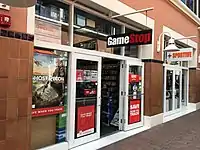
After being on medical leave since November 2017 due to reoccurrence of a brain tumor, J. Paul Raines resigned from GameStop on January 31, 2018, and died on March 4, 2018.[85] DeMatteo, GameStop's executive chairman stepped in as interim chief executive officer.[86] On February 6, 2018, the company announced Michael K. Mauler as CEO and member of the board of directors.[87] On May 11, 2018, Mauler resigned due to "personal reasons" and chairman Dan DeMatteo was named interim CEO. Mauler did not take any severance package or separation benefits.[88] On May 31, 2018, GameStop named Shane Kim as interim CEO.[89] Kim was replaced by George Sherman in March 2019.[90][91][92] On March 12, 2020, it was announced that a group of shareholders including Hestia Capital Partners LP and Permit Capital Enterprise Fund LP sent a "threat" letter to the Grapevine, Texas, company's board, urging it to appoint a stockholder representative as a director.[93]
American Division Efforts
_29.jpg.webp)
All GameStop stores in Puerto Rico were shut at the end of March 2016, citing increased rates of government taxes.[94]
In July 2019, GameStop partnered with an outside design firm, R/GA, to put forth plans to revamp stores to focus on competitive gaming and retrogaming, and to introduce new ways for customers to try games before buying them.[95][96] Each concept store is expected to be mutually exclusive.

A leaked email revealed on July 31, 2019, indicated that 50 employees, including district and regional managers,[97] would be laid off as a result of reorganization efforts.[98] In August 2019, GameStop laid off over 120 people, including about half of the staff of Game Informer, as part of its "GameStop Reboot initiative".[99]
In August 2019, Michael Burry's investment firm Scion Asset Management sent a letter to GameStop executives urging the company to engage in a $238 million stock buyback. The letter also revealed that Scion owned approximately 2,750,000 shares, or about 3.05% of GameStop. The stock price of GameStop, which had been in steady decline in share price since late January 2019, spiked roughly 20% after Burry revealed that he was buying the stock in an interview with Barron's. In the interview, Burry explained that both Sony and Microsoft would enter the next console generation with a physical disc drive and therefore likely extend the longevity of GameStop. He also noted that the company's balance sheet was in good condition.[100][101] In December 2019, GameStop announced that it spent $178.6 million to buy 34.6 million shares, or 34% of the shares outstanding, at an average price of $5.14 per share.[102] In May 2020, Burry lowered his stake in GameStop.[103]
After reporting that it had missed analysts' expectations during the 2nd quarter of the fiscal year 2019 ending August 2019, as reported in September 2019, GameStop announced that it was planning to close about 180–200 underperforming stores of the 5,700 it had worldwide in the short term, along with developing metrics to evaluate other potential closures over the next two years.[104] In March 2020, four members of GameStop's board of directors – Dan DeMatteo, Gerald Szczepanski, Larry Zilavy, and Steve Koonin – stepped down and were replaced by Reggie Fils-Aimé, Bill Simon and J.K. Symancyk as part of the company's effort to turn around the business.[105]
On October 8, 2020, GameStop announced an agreement with Microsoft to migrate backend systems to Microsoft 365 platforms including Dynamics 365, also including in-store usage of Microsoft Surface products by employees.[106][107] It was later reported that this agreement would also include revenue sharing on all digital game purchases for Xbox Series X and S for each product sold by the retailer, although the exact percentage of this share was not disclosed.[108]
Australian Division Efforts

GameStop's Australian division has been focused on increasing higher-margin merchandise and opening more large format hybrid stores which include both an EB Games and Zing Pop Culture store in a single location. These locations have an expanded selection of merchandise based on both games and pop culture. The Sydney Morning Herald reported the diversification into merchandise through the establishment of the Zing Pop Culture brand in 2014 had been vital in keeping the company profitable. The newspaper reported the greater focus on merchandise allowed the company to tap into the lucrative, higher-margin merchandise market of t-shirts, figurines and bobbleheads. The newspaper noted former staff agreed that the Australian divisions' merchandise pivot has been key to the divisions survival in Australia's tough retail landscape. However, they also pointed to the pre-owned games segment as a major part of its success.[109][110][111] GameStop's Australian division has been the only profitable segment of the global GameStop business for the 2020, 2021 and 2022 fiscal years. The company reported profits of US$9.4 million, US$52.2 million and US$30.6 million for each fiscal year respectively.
American Division Pandemic Response

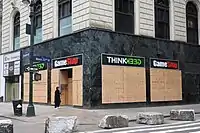
Government efforts to slow the spread of COVID-19 required GameStop to close the physical operation of all of its 3,500 stores from roughly March to May 2020, though not without some controversy in the early stages. Throughout this time, it continued with online and curbside sales. Sherman and the board of directors took a 50% pay cut while other executives took a 30% cut to offset losses.[112] While digital sales grew by 519%, its retail dropped by more than 30% in the same period from the prior year, and the chain reported a US$165 million loss in contrast to a US$6.8 million for the same quarter in 2019. However, with the Xbox Series X and PlayStation 5 still planned for release in the latter part of 2020, Sherman expected to be able to recover from these losses.[113]
In mid-March 2020, GameStop faced criticism for its response to the COVID-19 pandemic in North America, with employees and social media users accusing the company of placing its business ahead of the safety of its staff and customers, in order to capitalize on an influx of video game purchases and related products for entertainment during the pandemic and related lockdowns.[114][115][116] GameStop stated that it would suspend in-store events (including midnight launches) and the use of demo stations, perform additional cleaning, and structure lines and limit store capacity to enforce physical distancing.[116] To prevent enlarged crowds for two high-profile video game releases on March 20 — Animal Crossing: New Horizons and Doom Eternal, GameStop announced that it would begin selling Doom Eternal in its stores a day ahead of its official release date.[117]
Polygon reported on March 17 that several stores in the San Francisco area had remained open, seemingly in violation of a stay-at-home order issued by Bay Area counties that restricts non-essential business. Several employees told Polygon and Vice that they did not receive additional cleaning supplies that were to be provided by corporate, requiring them to purchase them on their own and request reimbursement.[114][118][116]
A memo obtained by Kotaku on March 19 indicated that GameStop saw itself as an essential business because some of its technology products are relevant to enhancing remote work, required in many cases during the pandemic. GameStop reiterated the safety measures that it had put in place, and also announced that it would reduce store hours and suspend all trade-ins until at least March 29, 2020, and offer curbside pickup.[119][118] An employee of a GameStop store in Athens, Georgia (which was shut down on March 20 by order of the police to comply with a similar order in Athens-Clark County) disputed the argument, saying that the high-end, gaming-oriented peripherals (such as keyboards and mice) sold at GameStop were not necessarily essential for remote work, and that cheaper alternatives were readily available at stores allowed to remain open, such as Walmart.[115]
California had announced a state-wide stay-at-home order on March 19; while GameStop had originally stated to its stores it was an essential retail business, by March 20 GameStop instead decided to close down its California branches, while keeping most other nationwide stores open.[120][115] Following similar stay-at-home orders in New York and Illinois over the following days, GameStop announced that it would close all locations effective March 22, with selected locations continuing to offer contact-free curbside pickup (where an employee, wearing either gloves or a bag over their hands, would slip the customer's order through the front door, remaining behind the glass)[121] and home delivery.[122] In early April 2020, a location in Dorchester, Boston received a nuisance citation by local police, who deemed the curbside pickup a violation of the Massachusetts stay-at-home order. GameStop subsequently ceased offering curbside pickup in the state.[121][123]
Canadian Division Pandemic Response
GameStop's Canadian subsidiary EB Games faced similar criticism on March 20 as well, as morning lineups for the new Animal Crossing and Doom games at a Toronto location induced large public gatherings discouraged by officials. The city's public health chief Eileen de Villa stated that the gathering did not "line up with what we expect from those in our community who are interested in protecting and strengthening our community". Mayor John Tory accused the company of "plac[ing] commerce above the public interest", while Premier of Ontario Doug Ford stated that "everyone in this province has a responsibility to make sure we protect each other and I am very, very disappointed in the store owner that would do this". EB Games later announced that it would close all Canadian stores on March 21.[124]
Australian Division Pandemic Response

GameStop's Australian subsidiary EB Games Australia was the only arm of the global GameStop business not to report huge COVID-related losses, with sales instead soaring by 30 per cent. In Australia COVID-19 lockdowns were managed by the Australian Federal Government National Cabinet which largely permitted retail stores to remain open with capacity limits in place.[125] This meant, unlike other arms of the GameStop business, the Australian arms stores remained open for the substantial majority of the pandemic. National Cabinet only mandated some brief regionally targeted entire store closures with stores in the Australian state of Victoria being the most heavily impacted. For fiscal year 2020 the Australian arm reported net sales of US$625.3 million and operating earnings of US$52.2 million. This was an increase of US$42.8 million in operating earnings compared to the pre-pandemic Fiscal Year 2019 where the company posted net sales of US$525.4 million and operating earnings of US$9.4 million.[126]
January 2021 short squeeze
In January 2021, a short squeeze resulted in a 1,500% increase in GameStop's share price over the course of two weeks, reaching an all-time intraday high of US$483.00 ($120.75 split-adjusted) as of January 29, 2021, on the New York Stock Exchange.[127][128] This effect was mainly attributed to a coordinated effort by the Reddit community r/wallstreetbets, a subreddit dedicated to stocks with high market risk.[127][129] A surge in the stock price in extended-hours trading occurred after Elon Musk made a post on Twitter that included "Gamestonk!" (in reference to r/wallstreetbets) and a link to the community.[130] Matt Levine has compared the situation to the 2012 "short squeeze" that the SEC charged Philip Falcone with.[131]
Other news in 2021–2023
In February 2021, GameStop announced that its finance chief Jim Bell, appointed in June 2019, would leave the company on March 26, 2021. Though no official reason was given for Bell's departure, the company said that it did not have to do with a disagreement with the company or its operations.[132][133][134]
In April 2021, George Sherman announced that he will step down as CEO of GameStop by July 31, 2021.[135][136][137][138] Also in April 2021, Ryan Cohen, founder of Chewy and a large GameStop shareholder, was named chairman, effective in June 2021.[139][140][141] On June 9, 2021, GameStop appointed former Amazon executives Matt Furlong and Mike Recupero as CEO and CFO respectively.[142] Furlong took over the position of CEO from Sherman on June 21, 2021.[142] Furlong was removed from his position as CEO in June 2023 and replaced by Ryan Cohen.[143]
In July 2022, it was announced that Mike Recupero was fired as CFO. He was replaced by Diana Saadeh-Jajeh, who was the company's chief accounting officer.[144]
In May 2023, it was announced that GameStop was closing down all of its stores in the Republic of Ireland.[145] In June 2023, all stores had closed down and their Irish website closed down at 4pm (IST), on June 21, and the remaining stores closed on June 24.
In September 2023, Cohen took over as CEO of the company, in addition to his chairman role, without collecting a salary.[146]
NFT platform
On May 26, 2021, GameStop announced that it was working on a non-fungible token (NFT) platform creating a token that is based on blockchain Ethereum technology.[147] Business Insider reported that "GameStop is building an NFT platform as part of an ambitious plan to transform itself into the Amazon of gaming."[148]
The Beta version of the platform launched on July 11, 2022. The marketplace is curated, with a vetting process in place for artists; in July 2022 GameStop removed an NFT associated with artwork which referenced the photo The Falling Man and removed the ability for the creator's account to mint new NFTs on its platform.[149] In another case, a user sold hundreds of NFTs associated with HTML5 games they did not have a license for. GameStop removed their minting ability and the listings for the NFTs on their marketplace, although the NFTs themselves remain on the blockchain, the games themselves on Gamestop's servers, and can be sold on other marketplaces.[150]
In December 2022, GameStop laid off a large portion of the team working on the NFT platform. In August 2023, GameStop announced wind down of its crypto and NFT wallet citing "regulatory uncertainty".[151]
Business operations
Atrix
Atrix (formerly @play) is GameStop, Incs. in-house store brand. GameStop sells gaming accessories, Headsets, Mice and Keyboards under the Atrix brand.[152]
Game Informer
Game Informer is a magazine owned by GameStop, Inc. and primarily sold through subscriptions which can be purchased at GameStop locations.[153] A subscription to the magazine is included for members of GameStop's PowerUp Rewards Pro loyalty program.[154]
Trade-ins
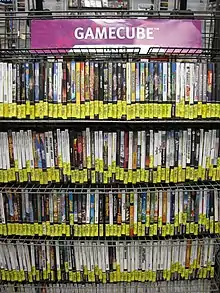
GameStop provides its customers either cash or trade credit in exchange for customers' unwanted video games, accessories, and tech.[155] The used video game trade-ins have twice the gross margins of new video game sales.[156] Some video game developers and publishers have criticized GameStop for its practices, as they receive no share of the revenue from the sale of used games. GameStop responded to these criticisms in 2009 by stating that 70% of store credit generated by game trade ins was used to purchase new rather than used games, generating close to $2 billion in annual revenue.[157]
GameStop TV
GameStop TV is the in-store television network run internally by GameStop, with non-endemic sales in partnership with Playwire Media. GameStop TV features programming targeted to consumers shopping in GameStop stores. Each month brings content segments about upcoming video game releases, exclusive developer interviews, and product demonstrations.[158]
Pre-order bonuses
Game publishers obtain more pre-orders by including exclusive in-game or physical bonuses, available only if the player pre-ordered the game. Bonuses typically include extras such as exclusive characters, weapons, and maps. For example, GameStop included an additional avatar costume for Call of Duty: Black Ops when it was released in November 2010,[159] and a pictorial Art-Folio for Metroid: Other M.[160] Soundtracks, artbooks, plushies, figurines, posters, and T-shirts have also been special bonuses.
GameTrust Games
In January 2016, GameStop announced a partnership with Insomniac Games with its 2016 title Song of the Deep. GameStop executive Mark Stanley said the concept was to help the chain have more direct communication with players, and would expect to expand out to other similar distribution deals with other developers if this one succeeds.[161] In April 2016, GameStop created the GameTrust Games publishing division to serve as a publisher for mid-sized developers. In April 2016, GameTrust Games announced it was working with Ready At Dawn, Tequila Works, and Frozenbyte to prepare more titles.[162]
Corporate affairs
Finances
| Australia Division | Canada Division | Europe Division | United States Division | Technology Brands | Total | |||||||
|---|---|---|---|---|---|---|---|---|---|---|---|---|
| Year | Net Sales | Operating Income | Net Sales | Operating Income | Net Sales | Operating Income | Net Sales | Operating Income | Net Sales | Operating Income | Net Sales | Operating Income |
| 1999 | - | - | - | - | - | - | $223.7 | $15.3 | - | - | $223.7 | $15.3 |
| 2000 | - | - | - | - | - | - | $756.7 | $5.6 | - | - | $756.7 | $5.6 |
| 2001 | - | - | - | - | - | - | $1,121.1 | $34.1 | - | - | $1,121.1 | $34.1 |
| 2002 | - | - | - | - | - | - | $1,352.8 | $87.1 | - | - | $1,352.8 | $87.1 |
| 2003 | - | - | - | - | $14.8 | -$0.4 | $1,564.0 | $104.8 | - | - | $1,578.8 | $104.4 |
| 2004 | - | - | - | - | $24.6 | -$3.0 | $1,818.2 | $102.1 | - | - | $1,842.8 | $99.1 |
| 2005 | $94.4 | $11.0 | $111.4 | $7.9 | $176.2 | $0.1 | $2,709.8 | $173.7 | - | - | $3,091.8 | $192.7 |
| 2006 | $288.1 | $27.3 | $319.7 | $20.0 | $441.6 | $1.0 | $4,269.5 | $285.4 | - | - | $5,318.9 | $333.7 |
| 2007 | $420.8 | $41.8 | $473.0 | $35.8 | $761.4 | $32.6 | $5,438.8 | $391.2 | - | - | $7,094.0 | $501.4 |
| 2008 | $520.0 | $46.8 | $548.2 | $32.6 | $1,271.0 | $65.6 | $6,466.7 | $530.1 | - | - | $8,805.9 | $675.1 |
| 2009 | $530.2 | $46.0 | $491.4 | $35.0 | $1,781.4 | $67.2 | $6,275.0 | $488.8 | - | - | $9,078.8 | $637.0 |
| 2010 | $565.2 | $41.0 | $502.3 | $22.6 | $1,725.0 | $68.2 | $6,681.2 | $530.8 | - | - | $9,473.7 | $662.6 |
| 2011 | $604.7 | $35.4 | $498.4 | $12.4 | $1,810.4 | $20.2 | $6,637.0 | $501.9 | - | - | $9,550.5 | $569.9 |
| 2012 | $607.3 | -$71.6 | $478.4 | -$74.4 | $1,608.6 | -$397.5 | $6,192.4 | $501.9 | - | - | $8,886.7 | -$41.6 |
| 2013 | $613.7 | $37.5 | $468.8 | $26.6 | $1,733.8 | $44.3 | $6,160.4 | $465.3 | $62.8 | -$0.2 | $9,039.5 | $573.5 |
| 2014 | $644.7 | $38.0 | $476.4 | $28.3 | $1,652.8 | $35.9 | $6,193.5 | $483.2 | $328.6 | $32.9 | $9,296.0 | $618.3 |
| 2015 | $591.4 | $38.7 | $446.6 | $29.4 | $1,356.7 | $48.8 | $6,435.1 | $504.3 | $534.0 | $27.0 | $9,363.8 | $648.2 |
| 2016 | $609.5 | $34.9 | $382.0 | $22.4 | $1,313.5 | $26.0 | $5,488.9 | $430.2 | $814.0 | $44.2 | $8,607.9 | $557.7 |
| 2017 | $702.2 | $34.9 | $434.9 | $18.5 | $1,534.0 | $53.0 | $5,749.9 | $344.9 | $803.6 | -$315.7 | $9,224.6 | $135.6 |
| 2018 | $645.4 | -$46.5 | $434.5 | -$19.3 | $1,405.2 | -$102.3 | $5,800.2 | -$533.9 | - | - | $8,285.3 | -$702.0 |
| 2019 | $525.4 | $9.4 | $344.2 | -$14.9 | $1,098.7 | -$50.2 | $4,497.7 | -$343.9 | - | - | $6,466.0 | -$399.6 |
| 2020 | $625.3 | $52.2 | $258.4 | -$0.3 | $789.0 | -$78.7 | $3,417.1 | -$211.0 | - | - | $5,089.8 | -$237.8 |
| 2021 | $591.8 | $30.6 | $332.3 | -$1.1 | $900.1 | -$39.9 | $4,186.5 | -$358.1 | - | - | $6,010.7 | -$368.5 |
| Amounts in millions USD | ||||||||||||
Store Count
As of 28 January 2023, the company operated 4,413 stores including 2,949 in the United States Division, 216 in the Canada Division, 419 in the Australia Division and 829 in the Europe Division.[1]
| GameStop Corp. Store Count | 2001[163] | 2002[164] | 2003[165] | 2004[166] | 2005[167] | 2006[168] | 2007[169] | 2008[170] | 2009[171] | 2010[172] | 2011[173] | 2012[174] | 2013[175] | 2014[176] | 2015[177] | 2016[178] | 2017[179] | 2018[180] | 2019[181] | 2020[182] | 2021[183] |
|---|---|---|---|---|---|---|---|---|---|---|---|---|---|---|---|---|---|---|---|---|---|
| Australia | - | - | - | - | 152[B] | 191 | 250 | 311 | 350 | 365 | 372 | 379 | 379 | 381[I] | 403 | 423 | 425 | 419 | 383 | 375 | 376 |
| New Zealand | - | - | - | - | 25[B] | 28 | 30 | 39[D] | 38 | 40 | 39 | 37 | 39 | 40 | 41 | 41 | 42 | 43 | 43 | 42 | 41 |
| Australia Division Total | - | - | - | - | 177 | 219 | 280 | 350 | 388 | 405 | 411 | 416 | 418 | 421 | 444 | 464 | 467 | 462 | 426 | 417 | 417 |
| Canada | - | - | - | - | 261[B] | 267 | 287 | 325 | 337 | 345 | 346 | 336 | 335 | 331 | 325 | 322 | 321 | 311 | 299 | 253 | 231 |
| Canada Division Total | - | - | - | - | 261 | 267 | 287 | 325 | 337 | 345 | 346 | 336 | 335 | 331 | 325 | 322 | 321 | 311 | 299 | 253 | 231 |
| Austria | - | - | - | - | 2[B] | 6 | 11 | 20 | 22 | 24 | 27 | 27 | 27 | 30 | 29 | 29 | 28 | 25 | 22 | 17 | 8 |
| Denmark | - | - | - | - | 23[B] | 26 | 31 | 37 | 42 | 44 | 42 | 40 | 37 | 37 | 36 | 34 | 34 | 34 | 32 | - | - |
| Finland | - | - | - | - | 1[B] | 1 | 13 | 14 | 14 | 17 | 19 | 20 | 20 | 18 | 18 | 18 | 16 | 16 | 16 | - | - |
| France | - | - | - | - | - | - | - | 332[E] | 368 | 379 | 391 | 397 | 422 | 434 | 433 | 432 | 425 | 420 | 413 | 399 | 399 |
| Germany | - | - | - | - | 77[B] | 95 | 137 | 179 | 195 | 205 | 208 | 208 | 209 | 209 | 216 | 217 | 214 | 208 | 199 | 186 | 172 |
| Ireland | - | - | 16[A] | 25 | 28 | 35 | 44 | 51 | 50 | 50 | 51 | 51 | 51 | 50 | 51 | 51 | 50 | 50 | 48 | 44 | 42 |
| Italy | - | - | - | - | 102[B] | 157 | 218 | 286 | 328 | 371 | 420 | 440 | 431 | 419 | 400 | 386 | 379 | 361 | 343 | 292 | 272 |
| Norway | - | - | - | - | 10[B] | 12 | 16 | 58[F] | 56 | 53 | 51 | 48 | 47 | 39 | 37 | 35 | 29 | 28 | 22 | - | - |
| Portugal | - | - | - | - | - | - | 10 | 13 | 14 | 13 | 13 | - | - | - | - | - | - | - | - | - | - |
| Spain | - | - | - | - | 123[B] | 101 | 93 | 132 | 124 | 140 | 116 | 110 | 47 | - | - | - | - | - | - | - | - |
| Sweden | - | - | - | - | 47[B] | 46 | 47 | 57 | 58 | 63 | 65 | 65 | 108 | 61 | 60 | 62 | 54 | 52 | 30 | - | - |
| Switzerland | - | - | - | - | 9[B] | 8 | 10 | 15 | 18 | 18 | 19 | 19 | 20 | 19 | 19 | 19 | 18 | 17 | 17 | 16 | 14 |
| United Kingdom | - | - | - | - | 6[B] | 6 | 6 | 7 | 7 | 7 | 1 | - | - | - | - | - | - | - | - | - | - |
| Europe Division Total | - | - | 16 | 25 | 428 | 493 | 636 | 1,201 | 1,296 | 1,384 | 1,423 | 1,425 | 1,455 | 1,316 | 1,299 | 1,283 | 1,247 | 1,211 | 1,142 | 954 | 907 |
| International Total | - | - | 16 | 25 | 866 | 979 | 1,203 | 1,876 | 2,021 | 2,134 | 2,180 | 2,177 | 2,208 | 2,068 | 2,068 | 2,069 | 2,035 | 1,984 | 1,867 | 1,624 | 1,555 |
| United States - Video Game Brands | 1,038 | 1,231 | 1,498 | 1,801 | 3,624[B] | 3,799[C] | 4,061 | 4,331 | 4,429 | 4,536 | 4,503 | 4,425 | 4,249 | 4,138[J] | 4,013 | 3,944 | 3,864 | 3,846 | 3,642 | 3,192 | 3,018 |
| United States - Technology Brands | - | - | - | - | - | - | - | - | - | - | - | - | 218[G][H] | 484 | 1,036 | 1,522 | 1,377 | - | - | - | - |
| United States Division Total | 1,038 | 1,231 | 1,498 | 1,801 | 3,624 | 3,799 | 4,061 | 4,331 | 4,429 | 4,536 | 4,503 | 4,425 | 4,467 | 4,622 | 5,049 | 5,466 | 5,241 | 3,846 | 3,642 | 3,192 | 3,018 |
| Total Store Count | 1,038 | 1,231 | 1,514 | 1,826 | 4,490 | 4,778 | 5,264 | 6,207 | 6,450 | 6,670 | 6,683 | 6,602 | 6,675 | 6,699 | 7,117 | 7,535 | 7,276 | 5,830 | 5,509 | 4,816 | 4,573 |
A Acquired a majority interest in Gamesworld Group Limited ("Gamesworld"), an Ireland-based video game retailer operating 10 stores expanding GameStop's operations into Ireland.
B Acquired Electronics Boutique Holdings Corp. ("EB Games"), a United States-based video games retailer operating approximately 2,300 stores expanding GameStop's operations in/into Australia, Canada, Europe, New Zealand and the United States.
C Acquired Game Brands Inc. ("Rhino Video Games"), a United States-based video game retailer operating 72 stores and expanding GameStop's United States operations
D Acquired The Gamesman Limited ("The Gamesman"), a New Zealand-based video game retailer operating 8 video game stores expanding GameStop's operations in New Zealand.
E Acquired SFMI Micromania ("Micromania"), a France-based video game retailer operating 332 video game stores expanding GameStop's operations into France.
F Acquired Free Record Shop Norway AS ("Free Record Shop"), a Norway-based record store retailer operating 49 stores. GameStop converted these record stores into video game stores.
G Acquired Simply Mac, Inc. ("Simply Mac"), a United States-based Apple specialty store retailer.
H Acquired Spring Communications, Inc. ("Spring Mobile"), a United States-based Apple wireless retailer.
I Launched Zing Pop Culture, an Australia-based Pop Culture retailer.
J Acquired Geeknet, Inc. ("ThinkGeek"), a United States-based online and wholesale Pop Culture retailer.
Subsidiaries
As of 29 January 2022, GameStop Corp. operated 32 subsidiaries.[184]
| GameStop Corp. (Delaware) | |||||||||||||||||||||||||||||||||||||||||||||||||||||||||||||||||||||||||||||||||||||||||||||
| ELBO Inc. (Delaware) | GameStop, Inc. (Minnesota) | Geeknet, Inc. (Delaware) | GME Entertainment, LLC (Delaware) | GS Mobile, Inc. (Delaware) | Marketing Control Services, Inc. (Virginia) | ||||||||||||||||||||||||||||||||||||||||||||||||||||||||||||||||||||||||||||||||||||||||
| EB International Holdings, Inc. (Delaware) | Sunrise Publications, Inc. (Minnesota) | GameStop Service Holdings, LLC (Delaware) | GameStop Texas Ltd. (Delaware) | ||||||||||||||||||||||||||||||||||||||||||||||||||||||||||||||||||||||||||||||||||||||||||
| Nordic Bear Holdings Limited (Ireland) | GameStop Global Holdings S.à r.l. (Luxembourg) | GameStop Service Company, LLC (Delaware) | GameStop Pennsylvania, LLC (Delaware) | SOCOM LLC (Delaware) | |||||||||||||||||||||||||||||||||||||||||||||||||||||||||||||||||||||||||||||||||||||||||
| Electronics Boutique Australia Pty. Limited (Australia) | Electronics Boutique Canada Inc. (Canada) | GameStop Europe Holdings S.à r.l. (Luxembourg) | Micromania GameStop SAS (France) | ||||||||||||||||||||||||||||||||||||||||||||||||||||||||||||||||||||||||||||||||||||||||||
| GameStop Austria GmbH (Austria) | GameStop Deutschland GmbH (Germany) | GameStop Denmark ApS (Denmark) | GameStop Europe Services Limited (Ireland) | GameStop Iberia S.L. (Spain) | GameStop Italy S.r.l. (Italy) | GameStop Oy (Finland) | GameStop Sweden AB (Sweden) | GameStop Schweiz GmbH (Switzerland) | GameStop Limited (Ireland) | Polarford Limited (Ireland) | Micromania Group SAS (France) | ||||||||||||||||||||||||||||||||||||||||||||||||||||||||||||||||||||||||||||||||||
| Micromania SAS (France) | |||||||||||||||||||||||||||||||||||||||||||||||||||||||||||||||||||||||||||||||||||||||||||||
See also
References
- "GameStop Corp. fiscal 2022 Form 10-K Annual Report". U.S. Securities and Exchange Commission. March 28, 2023.
- Gilbert, Ben (January 23, 2020). "The world's biggest video game retailer, GameStop, is dying: Here's what led to the retail giant's slow demise". Business Insider.
- "GameStop | 2021 Fortune 500". Fortune. Retrieved September 3, 2021.
- Manharjoshi (February 1, 2021). "Decoding the GameStop Scene-2". Medium.
- Cain, Áine (July 25, 2019). "4 retro video game and software stores that have been deleted from malls across America". Business Insider.
- Bounds, Jeff (July 1, 2010). "The Ross Perot Factor". American City Business Journals. Archived from the original on September 10, 2014.
- "GameStop Corp. History". Funding Universe.
- Jones, Kathryn (August 26, 1994). "Company News; Two Software Peers Combine Their Specialties". The New York Times.
- "Babbage's Inc. merging with Software Etc". The Baltimore Sun. August 26, 1994.
- "NeoStar Retail Group Inc". The Wall Street Journal. January 31, 1995.
- Steve Brown (October 24, 1995). "NeoStar moving to Grapevine". The Dallas Morning News.
- "NeoStar Merges Units And Ousts Executives Amid Weak Quarter". The Wall Street Journal. May 24, 1996.
- Tejada, Carlos (November 12, 1996). "NeoStar to Stop Stocking Stores, Plans Their Sale". The Wall Street Journal.
- Kezar, Korri (May 3, 2016). "GameStop co-founder retiring next month". American City Business Journals.
- "COMPANY NEWS; BOOKSELLER TO BUY BABBAGE'S ETC. FOR $215 MILLION". The New York Times. Bloomberg News. October 7, 1999.
- Quick, Rebecca (October 7, 1999). "Barnes & Noble Agrees to Purchase Babbage's Chain Owned by Its Chief". The Wall Street Journal.
- Quick, Rebecca (May 8, 2000). "Barnes & Noble Makes Another Play in Video Games --- Funco Purchase Wagers That Future Growth Action Will Be in That Industry". The Wall Street Journal.
- "GameStop Corp. 2002 Form 10-K Annual Report". U.S. Securities and Exchange Commission.
- ORLAND, KYLE (August 2, 2019). "Why the gaming world will be worse once GameStop is gone". Archived from the original on January 27, 2021.
- Blessing, Kelly (August 7, 2012). "GameStop Magazine Growth Vaults It Past Better Homes & Gardens". Bloomberg News. Archived from the original on September 10, 2014.
- "GameStop Corp. Form S-4 Annual Report". U.S. Securities and Exchange Commission. April 26, 2006.
- "GameStop IPO up 12%". CNN. February 13, 2002.
- Trachtenberg, Jeffrey A. (October 5, 2004). "Barnes & Noble Pares GameStop". The Wall Street Journal.
- "Blockbuster Reaches Agreement to Sell Rhino Video Games to GameStop" (Press release). PR Newswire. January 5, 2007 – via Houston Chronicle.
- Ransom-Wiley, J. (January 8, 2007). "Confirmed: Rhino sold to GameStop". Engadget.
- Kitchen, Michael (March 31, 2008). "GameStop to acquire Norway's Free Record Shop". MarketWatch.
- Snow, Jean (October 2, 2008). "GameStop Acquires French Retailer Micromania". Wired.
- Gallagher, Dan (October 1, 2008). "GameStop to buy French video game retailer". MarketWatch.
- Grace, Kerry E. (October 1, 2008). "GameStop to Buy French Videogame Retailer". The Wall Street Journal.
- Kennedy, John (November 9, 2009). "GameStop acquires stake in JOLT Online". Silicon Republic.
- Kehoe, Ian (November 8, 2009). "Collins sells stake in Jolt games". Business Post. Archived from the original on April 20, 2021. Retrieved April 20, 2021.
- Wingfield, Nick (July 28, 2010). "GameStop to Acquire Online Distributor". The Wall Street Journal.
- "GameStop Acquires Social Gaming Site Kongregate". TechCrunch. July 27, 2010.
- Takahashi, Dean (June 20, 2017). "MTG buys GameStop's mobile game publisher Kongregate for $55 million". VentureBeat.
- "GameStop Announces Acquisition of Spawn Labs and Agreement to Acquire Impulse, Inc" (Press release). Business Wire. March 31, 2011.
- Jenkins, David (April 1, 2011). "GameStop to acquire Stardock's Impulse download service". GamesIndustry.biz. Archived from the original on February 2, 2021.
- Grubb, Jeff (March 27, 2014). "GameStop closes its game-streaming division — will focus on PlayStation Now". VentureBeat.
- Abril, Danielle (August 16, 2013). "How DFW's new Apple retailer could help GameStop grow". American City Business Journals.
- Marum, Anna (April 9, 2015). "GameStop's Simply Mac buys The Mac Store in continued expansion effort". The Oregonian. Archived from the original on January 11, 2019.
- "GameStop-owned Simply Mac goes where Apple stores won't". Dallas Morning News. August 16, 2013. Archived from the original on April 12, 2019.
- KASKOVICH, STEVE (April 22, 2014). "GameStop to ramp up expansion of wireless, Apple product stores". Fort Worth Star-Telegram. Archived from the original on April 13, 2019.
- Miller, Chance (January 19, 2017). "Apple Authorized Reseller Simply Mac closing multiple locations around the United States this month". 9to5Mac.
- "Simply Mac stores closing amid apparent corporate restructuring". AppleInsider. January 19, 2017. Archived from the original on November 26, 2020.
- "Cool Holdings to Buy Simply Mac from GameStop As It Executes Expansion Plans" (Press release). PR Newswire. May 9, 2019.
- Arrojas, Matthew (January 23, 2020). "South Florida company owes GameStop millions after missing payment on an acquisition deal". American City Business Journals.
- Abril, Danielle (July 16, 2014). "GameStop acquires 19 stores for Spring Mobile expansion". American City Business Journals.
- Hals, Tom (February 26, 2015). "GameStop Nabs 163 RadioShack Leases for Spring Mobile Push". Reuters. Archived from the original on January 27, 2021.
- "GameStop Completes Acquisition of Geeknet" (Press release). GameStop. July 17, 2015.
- Palmeri, Christopher (August 2, 2016). "GameStop Acquires 507 AT&T Stores in Diversification Plan". Bloomberg News.
- "Draw Another Circle, LLC Adds MovieStop To Its Portfolio Of Companies To Create A Family Of Specialty Entertainment Retailers". PR Newswire. October 31, 2014. Archived from the original on June 22, 2015.
- "Tully & Holland advises GameStop in the divestiture of its MovieStop division". Tully & Holland. January 18, 2012. Archived from the original on March 8, 2015. Retrieved September 8, 2015.
- Gruenwedel, Erik (November 3, 2014). "MovieStop Acquired by Hastings Entertainment Owner". Home Media Magazine. Archived from the original on November 24, 2015.
- Brickley, Peg (June 13, 2016). "Hastings Entertainment, MovieStop File for Bankruptcy". The Wall Street Journal. ISSN 0099-9660. Archived from the original on November 8, 2020.
- Thompson, Steven R. (October 25, 2012). "GameStop to debut new GameStop Kids stores". American City Business Journals. Archived from the original on October 29, 2012.
- "80 Holiday 'GameStop Kids' Stores Coming to Mall Near You". PC Magazine. Archived from the original on January 11, 2019.
- "Frequently asked questions - ZiNG Pop Culture". zingpopculture.com.au. Archived from the original on August 22, 2016. Retrieved August 22, 2016.
- "Gamestop names new CEO, Fontaine remains chairman". Reuters. August 29, 2008.
- Kezar, Korri (November 14, 2017). "GameStop names interim leader as CEO is treated for illness". American City Business Journals.
- Halkias, Maria (March 5, 2018). "Former GameStop CEO Paul Raines, known for his personable leadership style, dies at 53". Dallas Morning News.
- HEID, JASON. "Breakfast With: J. Paul Raines of GameStop". D Magazine. Archived from the original on November 24, 2020.
- Bishop, Sam (January 12, 2017). "The physical gaming market declined in the UK last year". Gamez Publishing. Archived from the original on January 16, 2017. Retrieved January 13, 2017.
- Calvin, Alex (January 5, 2017). "ERA: 2016 physical games revenue down 16.4% year-on-year, but digital up 12.1%". Archived from the original on January 16, 2017. Retrieved January 13, 2017.
- Kezar, Korri (January 13, 2017). "No reindeer games: GameStop posts 16 percent holiday sales drop". American City Business Journals. Archived from the original on January 15, 2017.
- "GameStop Reports 2016 Holiday Sales Results" (Press release). GlobeNewswire. January 13, 2017.
- Schreier, Jason (February 1, 2017). "New GameStop Program Leads Employees To Lie To Customers". Kotaku. Archived from the original on March 1, 2017.
- Schreier, Jason (February 3, 2017). "'We Are All Scared For Our Jobs': GameStop Employees Share Their Circle Of Life Stories". Kotaku. Archived from the original on March 1, 2017.
- Schreier, Jason (February 24, 2017). "Sources: GameStop Changes Controversial Circle of Life Program". Kotaku. Archived from the original on February 27, 2017.
- Bary, Emily (January 13, 2017). "Videogame Sales Are Fading and It's Crushing GameStop". Barron's. Archived from the original on January 13, 2017.
- Weinberger, Matt (February 28, 2017). "GameStop shares sank 8 percent on Tuesday after Microsoft unveiled a new attack on the used game business". Business Insider. Archived from the original on March 3, 2017.
- Armental, Maria (March 23, 2017). "GameStop Closing At Least 150 Stores Amid Sales Decline". The Wall Street Journal. Archived from the original on March 23, 2017.
- Molina, Brett (March 24, 2017). "GameStop closing 150 stores as it shifts business focus". USA TODAY. Archived from the original on June 2, 2020.
- "GameStop Reports Fourth Quarter and Fiscal 2018 Results and Provides Fiscal 2019 Outlook" (Press release). GlobeNewswire. April 2, 2019.
- Gilbert, Ben (January 23, 2020). "The world's biggest video game retailer, GameStop, is dying: Here's what led to the retail giant's slow demise". Business Insider. Archived from the original on January 30, 2021.
- Noto, Anthony (June 19, 2018). "GameStop is for sale and Sycamore is a likely buyer". American City Business Journals. Archived from the original on January 11, 2019.
- Fingas, Jon (June 19, 2018). "GameStop confirms buyout talks as downloads take their toll". Engadget. Archived from the original on June 22, 2018 – via MSN.
- Lenihan, Rob (January 4, 2019). "GameStop Climbs on Report P/E Firms Are Bidding for the Videogame Retailer". TheStreet.com. Archived from the original on January 6, 2019.
- Crecente, Brian (January 29, 2019). "GameStop Just Gave Up On Trying to Sell Company". Variety. Archived from the original on January 29, 2019.
- Garber, Jonathan (January 29, 2019). "GameStop crashes to 14-year low after board terminates plans to sell the company (GME)". Business Insider. Archived from the original on January 30, 2019.
- Sun, Leo (January 31, 2019). "3 Reasons GameStop Failed to Attract Buyers". The Motley Fool.
- Sinclair, Brendan (April 21, 2019). "GameStop posts $673m full-year loss". GameIndustry.biz. Archived from the original on April 21, 2019. Retrieved April 21, 2019.
- Makedonski, Brett (April 2, 2019). "GameStop is losing so much money". Destructoid.
- Villasanta, Arthur (June 4, 2019). "GameStop Stock Drops 30% As Video Game Shop Eliminate Dividends". International Business Times.
- Thomas, Patrick (June 4, 2019). "GameStop Eliminates Dividend, as Sales Fall". The Wall Street Journal.
- Schuetz, Molly (December 8, 2021). "GameStop Reports Wider Loss as Investors Await News on Strategy - BNN Bloomberg". BNN. Retrieved December 8, 2021.
- Halkias, Maria (March 3, 2018). "Former GameStop CEO Paul Raines, known for his personable leadership style, dies at 53". The Dallas Morning News. Archived from the original on June 12, 2018.
- Halkias, Maria (February 5, 2018). "GameStop CEO Paul Raines resigns from board due to illness". Dallas Morning News. Archived from the original on January 11, 2019.
- Assis, Claudia. "GameStop names Michael Mauler its new CEO". MarketWatch. Archived from the original on February 24, 2020.
- Hayes, Matthew (May 11, 2018). "GameStop CEO Unexpectedly Resigns". Comicbook.com. Archived from the original on February 24, 2020. Retrieved May 11, 2018.
- "GameStop Reports First Quarter Fiscal 2018 Results" (Press release). GameStop. May 31, 2018. Archived from the original on September 24, 2020.
- Cherney, Max A. "GameStop names new CEO". MarketWatch. Archived from the original on November 27, 2020.
- Al-Muslim, Aisha (March 21, 2019). "GameStop Names New CEO". The Wall Street Journal. ISSN 0099-9660. Archived from the original on January 27, 2021.
- Womack, Brian (March 21, 2019). "GameStop names retail veteran as new CEO at challenged retailer". American City Business Journals. Archived from the original on January 27, 2021.
- Driebusch, Corrie (March 12, 2020). "GameStop Under Renewed Pressure from Unhappy Investor Group". The Wall Street Journal. Archived from the original on January 27, 2021.
- Makuch, Eddie (January 11, 2016). "Gamestop Closing All Puerto Rico Stores Very Soon". GameSpot. Archived from the original on November 8, 2020.
- Wilds, John (July 16, 2019). "GameStop to Create New Store Concept, Offer Retro Gaming". www.ign.com. IGN. Archived from the original on November 8, 2020. Retrieved January 27, 2021.
- Makuch, Eddie (July 17, 2019). "GameStop Is Testing Much Different Store Layouts, Including Retro-Focused Ones". www.gamespot.com. GameSpot. Archived from the original on November 8, 2020. Retrieved January 27, 2021.
- YADEN, JOSEPH. "GameStop Hit With Massive Layoffs Following Company Restructure". PlayStation LifeStyle. Archived from the original on August 1, 2019.
- Quilty, John (July 31, 2019). "GameStop Reportedly Laying Off Over 50 Employees As Part of Reorganization". TechRaptor. Archived from the original on August 1, 2019. Retrieved January 27, 2021.
- Schreier, Jason (August 20, 2019). "GameStop Lays Off Over 100 People, Including Nearly Half Of Game Informer's Staff". Kotaku. Archived from the original on August 20, 2019.
- "Scion Asset Management Urges GameStop to Buy Back $238 Million of Stock with Cash on Hand" (Press release). Business Wire. August 19, 2019. Archived from the original on August 28, 2019.
- Wick, Ben (August 22, 2019). "GameStop soars after 'Big Short' investor Michael Burry says it still has big upside (GME)". Business Insider. Archived from the original on August 22, 2019.
- "GameStop Reports Third Quarter Fiscal 2019 Results and Updates Fiscal 2019 Guidance" (Press release). GlobeNewswire. December 10, 2019. Archived from the original on January 4, 2020.
- Lin, Ed (May 7, 2020). "'Big Short' Investor Michael Burry Lowers Stake in GameStop Stock". Barron's. Archived from the original on January 25, 2021.
- Valentine, Rebekah (September 10, 2019). "GameStop to close 180-200 "underperforming" stores globally this year". GamesIndustry.biz. Archived from the original on September 11, 2019.
- Grubb, Jeff (March 9, 2020). "GameStop appoints Reggie Fils-Aimé to board of directors". Venture Beat. Archived from the original on March 10, 2020.
- "GameStop announces multiyear strategic partnership with Microsoft" (Press release). Microsoft. October 8, 2020.
- Bary, Emily. "GameStop stock surges after Microsoft partnership announcement". MarketWatch. Archived from the original on October 14, 2020. Retrieved October 8, 2020.
- Orland, Kyle (October 15, 2020). "Microsoft will give GameStop a share of Xbox's digital revenues". Ars Technica. Archived from the original on January 19, 2021. Retrieved October 20, 2020.
- Walker, Alex (January 8, 2020). "EB Games Are Shutting Stores Across Australia [Update]". Kotaku Australia. Retrieved March 29, 2022.
- Elmas, Matthew (January 10, 2020). "EB Games to shutter 19 stores as digital competition bites". SmartCompany. Retrieved March 29, 2022.
- Powell, Dominic (February 5, 2021). "'Mario cuts through everything': How EB Games survived retail's great battle". The Sydney Morning Herald. Retrieved March 29, 2022.
- Amore, Samson (April 23, 2020). "GameStop CEO George Sherman, Executive Team Take 50% Pay Cut Amid Coronavirus Pandemic". TheWrap.
- Makuch, Eddie (June 9, 2020). "GameStop Loses $165 Million After Temporarily Closing More Than 3,000 Stores Due To COVID-19". GameSpot. Archived from the original on June 10, 2020.
- Klepek, Patrick (March 17, 2020). "GameStop Has No Idea What to Do About Coronavirus". Vice Media. Archived from the original on September 24, 2020.
- Liao, Shannon (March 20, 2020). "GameStop says it's an essential business. Employees are outraged". CNN. Archived from the original on April 8, 2020.
- Campbell, Colin (March 17, 2020). "GameStop workers say the company is failing to address the coronavirus". Polygon. Archived from the original on September 9, 2020.
- Makuch, Eddie. "GameStop Sold Doom Eternal A Day Early Due To "Social Distancing" Concerns". GameSpot. Archived from the original on November 15, 2020.
- Orland, Kyle (March 20, 2020). "GameStop says it's "essential retail" to fight forced closures [Updated]". Ars Technica. Archived from the original on April 8, 2020.
- Farokhmanesh, Megan (March 19, 2020). "GameStop claims it is "essential retail" to remain open amid coronavirus pandemic". The Verge. Archived from the original on December 31, 2020.
- Lyles, Taylor (March 20, 2020). "GameStop to close all California stores indefinitely". The Verge. Archived from the original on April 8, 2020.
- Johnston, Katie (April 3, 2020). "After instructing employees to wrap their hands in plastic bags and go back to work, GameStop shuts down Mass. stores". The Boston Globe. Archived from the original on November 24, 2020.
- Orland, Kyle (March 22, 2020). "GameStop shuts down regular operations amid coronavirus closures". Ars Technica. Archived from the original on April 8, 2020.
- Good, Owen (April 5, 2020). "Boston authorities shut down GameStop and stores close statewide". Polygon. Archived from the original on January 27, 2021.
- "EB Games to close Saturday, as Ford fumes while dozens line up for launch, despite pandemic". Toronto Star. March 20, 2020. Archived from the original on April 8, 2020. Retrieved March 21, 2020.
- "A timeline of Covid-19 in Australia, two years on". Time Out Melbourne. Retrieved June 30, 2022.
- "GameStop Corp. 2020 Form 10-K Annual Report". U.S. Securities and Exchange Commission.
- Li, Yun (January 27, 2021). "GameStop mania explained: How the Reddit retail trading crowd ran over Wall Street pros". CNBC. Archived from the original on January 27, 2021. Retrieved January 27, 2021.
- "GAMESTOP CORPORATION (GME)". NYSE. Archived from the original on January 19, 2021. Retrieved January 28, 2021.
- Roberts, Jeff John (January 25, 2021). "GameStop 'yolo' rally blasts on, leaving short sellers squeezed". Fortune. Archived from the original on January 26, 2021.
- Bursztynsky, Jessica (January 26, 2021). "GameStop jumps after hours as Elon Musk tweets out Reddit board that's hyping stock". CNBC. Archived from the original on January 27, 2021.
- Levine, Matt (January 26, 2021). "GameStop Is Just a Game". Bloomberg News. Archived from the original on January 26, 2021.
- Duffy, Clare (February 23, 2021). "GameStop CFO resigns a month after the Reddit trading frenzy". CNN.
- Gilbert, Ben (February 23, 2021). "GameStop's CFO exits as the company attempts a 'transformation' led by activist investor Ryan Cohen". Business Insider.
- Trentmann, Nina; Maurer, Mark (February 24, 2021). "GameStop CFO Resigns Weeks After Reddit-Fueled Stock-Market Frenzy". The Wall Street Journal. ISSN 0099-9660.
- Needleman, Sarah E.; Sebastian, Dave (April 19, 2021). "GameStop CEO George Sherman to Step Down by July 31". The Wall Street Journal.
- La Monica, Paul R. (April 19, 2021). "GameStop CEO George Sherman is stepping down, sending the stock soaring". CNN.
- "GameStop CEO George Sherman to step down". Reuters. April 19, 2021 – via CNBC.
- Mihalcik, Carrie (April 19, 2021). "GameStop CEO George Sherman to step down by end of July". CNET.
- Thomas, Lauren (April 8, 2021). "GameStop says it will name Ryan Cohen chairman". CNBC.
- ORLAND, KYLE (April 8, 2021). "Why some investors are excited about Ryan Cohen as GameStop's next chairman". Ars Technica.
- Kilgore, Tomi (April 8, 2021). "GameStop stock rallies after plans to name Ryan Cohen as chairman". MarketWatch.
- Lewis, Katrina; Owram, Kristine (June 10, 2021). "GameStop Slides on Stock Sale Plan, SEC Trading Investigation". Bloomberg. Retrieved June 10, 2021.
- A, Samrhitha; Herbst-Bayliss, Svea (June 8, 2023). "GameStop ousts CEO, elevates Cohen as sales fall again". Reuters. Retrieved June 8, 2023.
- Isidore, Chris (July 8, 2022). "GameStop fires its CFO and looks to cut staff". CNN Business.
- "GameStop confirms closure of Irish stores after losses surpass €40m". May 5, 2023.
- "Billionaire Ryan Cohen takes over as CEO at GameStop, adding to chairman role". AP News. September 28, 2023.
- Perper, Rosie (May 25, 2021). "GameStop Quietly Announces That It's Working on NFTs". HypeBeast.com. Archived from the original on May 25, 2021. Retrieved July 26, 2021.
- Nagarajan, Shalini (May 26, 2021). "GameStop is building an NFT platform as part of an ambitious plan to transform itself into the Amazon of gaming". Business Insider. Archived from the original on October 15, 2022. Retrieved July 26, 2021.
- Bonifacic, Igor (July 23, 2022). "GameStop is letting someone sell an NFT that references a 9/11 photo". Engadget. Archived from the original on April 7, 2023. Retrieved July 23, 2022 – via engadget.com.
- Orland, Kyle (August 5, 2022). "Indie devs outraged by unlicensed game sales on GameStop's NFT market". Ars Technica. Archived from the original on February 10, 2023. Retrieved August 5, 2022.
- Purdy, Kevin (August 4, 2023). "GameStop, citing "regulatory uncertainty," winds down its crypto and NFT wallet". Ars Technica. Retrieved August 6, 2023.
- "ATRIX Trademark of GameStop Texas Ltd.. Serial Number: 90103851 :: Trademark Elite Trademarks". www.trademarkelite.com. Retrieved July 31, 2022.
- Gaudiosi, John. "GameStop Dives Into Publishing With 'Song of the Deep'". Fortune. Archived from the original on January 24, 2021.
- "GameStop Redesigns PowerUp Rewards Loyalty Program, Providing Pro-Level Members More Benefits and Flexibility" (Press release). GlobeNewswire. February 24, 2020.
- Trautman, Ted (March 28, 2014). "Why Used Video Games Are Such a Big Business". The New Yorker. Archived from the original on December 24, 2020.
- Green, Timothy (September 11, 2018). "GameStop's Most Important Business Is in Trouble". The Motley Fool.
- Kim, Ryan (June 4, 2009). "Video game manufacturers may pressure resellers". San Francisco Chronicle. Archived from the original on February 4, 2021.
- Castillo, Michelle (December 20, 2016). "How Gamestop will make money off customers who don't buy anything". CNBC.
- Bradford, Matt (September 16, 2010). "Call of Duty: Blacks Ops pre-order bonuses include art and avatar gear". gamesradar. Archived from the original on February 8, 2021. Retrieved January 29, 2021.
- Fletcher, JC (May 28, 2010). "Metroid: Other M pre-orders include 'art folio' at GameStop". Engadget. Retrieved January 29, 2021.
- Gaudiosi, John (January 28, 2016). "GameStop Dives Into Publishing With 'Song of the Deep'". Fortune. Archived from the original on January 29, 2016.
- Francis, Bryant (April 18, 2016). "GameStop announces publishing division GameTrust". Game Developer. Archived from the original on August 27, 2021.
- "GameStop Corp. Form 10-K 2002". www.sec.gov. U.S. Securities and Exchange Commission. Retrieved September 2, 2022.
- "GameStop Corp. Form 10-K 2003". www.sec.gov. U.S. Securities and Exchange Commission. Retrieved September 2, 2022.
- "GameStop Corp. Form 10-K 2004". www.sec.gov. U.S. Securities and Exchange Commission. Retrieved September 2, 2022.
- "GameStop Corp. Form 10-K 2005". www.sec.gov. U.S. Securities and Exchange Commission. Retrieved September 2, 2022.
- "GameStop Corp. Form 10-K 2006". www.sec.gov. U.S. Securities and Exchange Commission. Retrieved September 2, 2022.
- "GameStop Corp. Form 10-K 2007". www.sec.gov. U.S. Securities and Exchange Commission. Retrieved September 2, 2022.
- "GameStop Corp. Form 10-K 2008". www.sec.gov. U.S. Securities and Exchange Commission. Retrieved September 2, 2022.
- "GameStop Corp. Form 10-K 2009". www.sec.gov. U.S. Securities and Exchange Commission. Retrieved September 2, 2022.
- "GameStop Corp. Form 10-K 2010". www.sec.gov. U.S. Securities and Exchange Commission. Retrieved September 2, 2022.
- "GameStop Corp. Form 10-K 2011". www.sec.gov. U.S. Securities and Exchange Commission. Retrieved September 2, 2022.
- "GameStop Corp. Form 10-K 2012". www.sec.gov. U.S. Securities and Exchange Commission. Retrieved September 2, 2022.
- "GameStop Corp. Form 10-K 2013". www.sec.gov. U.S. Securities and Exchange Commission. Retrieved September 2, 2022.
- "GameStop Corp. Form 10-K 2014". www.sec.gov. U.S. Securities and Exchange Commission. Retrieved September 2, 2022.
- "GameStop Corp. Form 10-K 2015". www.sec.gov. U.S. Securities and Exchange Commission. Retrieved September 2, 2022.
- "GameStop Corp. Form 10-K/A 2016". www.sec.gov. U.S. Securities and Exchange Commission. Retrieved September 2, 2022.
- "GameStop Corp. Form 10-K 2017". www.sec.gov. U.S. Securities and Exchange Commission. Retrieved September 2, 2022.
- "GameStop Corp. Form 10-K 2018". www.sec.gov. U.S. Securities and Exchange Commission. Retrieved September 2, 2022.
- "GameStop Corp. Form 10-K 2019". www.sec.gov. U.S. Securities and Exchange Commission. Retrieved September 2, 2022.
- "GameStop Corp. Form 10-K 2020". www.sec.gov. U.S. Securities and Exchange Commission. Retrieved September 2, 2022.
- "GameStop Corp. Form 10-K 2021". www.sec.gov. U.S. Securities and Exchange Commission. Retrieved September 2, 2022.
- "GameStop Corp. Form 10-K 2022". www.sec.gov. U.S. Securities and Exchange Commission. Retrieved September 2, 2022.
- "Gamestop Corp. Subsidiaries". sec.gov. U.S. Securities and Exchange Commission. Retrieved September 10, 2022.
External links
- Official website
- Business data for GameStop Corp. Class A: